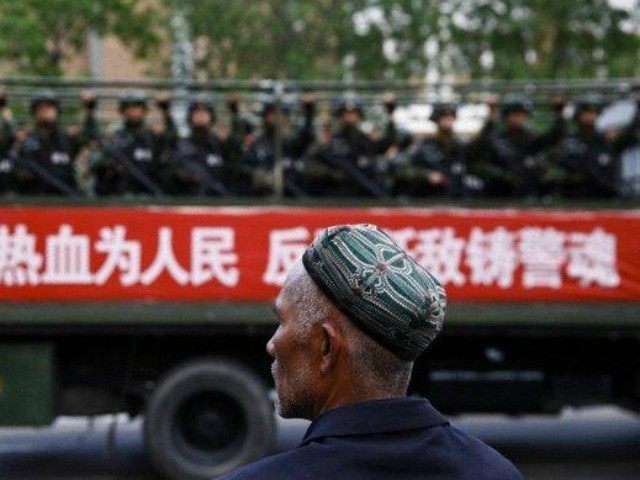Xinhua, China’s state news outlet, has published a scathing rebuke of Human Rights Watch following HRW’s criticism of Chinese authoritarianism, and its opinion that a proposed Chinese counter-terrorism law would “legitimate ongoing human rights violations and facilitate future abuses.”
Xinhua wastes no time dropping proverb bombs on their NGO nemesis, which it claims is not a “non-governmental organization” at all, but rather an arm of the hostile United States government:
A new year has arrived and people around the world are filled with fresh expectations. However, self-styled American observers and commentators grouped under the so-called NGO Human Rights Watch have, once again, published an annual World Report on Human Rights.
Predictably, the report finds faults in the human rights situation in countries and regions including China.
The Chinese expression: “To hoodwink the world as a squid discharges black ink”, perfectly summarizes the HRW report.
The article continues with a condemnation of a petition from Nobel Peace Prize winners Adolfo Perez Esquivel and Mairead Corrigan Maguire, with 129 other signatories, which criticized HRW for having “close ties to the U.S. government which call into question its independence.” There has been plenty of mudslinging back and forth about this, but in essence, the authors of the petition contend that Human Rights Watch employs too many former American officials, including veterans of the CIA and a former NATO Secretary General, thus compromising the independence of the group. They think this influence causes Human Rights Watch to go easy on American violations.
To give an idea of the tenor of the criticism, Xinhua relates the authors of the petition describing the CIA as “one of the world’s greatest institutional human rights violators over the past half-century.” They also whine about HRW treating Venezuela as more of a human-rights abuser than the U.S. and claim that the Obama Administration discussing the possibility of missile strikes against military targets within the Assad regime is morally equivalent to Assad actually raining rocket death on his own people.
It’s a pity these petitioners didn’t get Nobel Peace Prize Laureate Liu Xiaobo to sign up. That might be because Liu Xiaobo is still rotting away in a Chinese political prison, four years after winning his award.
Perhaps the strongest criticism that could be leveled against Human Rights Watch is that they took the pile of nitwittery from Esquivel and Mairead seriously enough to respond, but respond they did, correcting some factual inaccuracies in the position, providing a list of recent reports where they have given the U.S. government grief, and pointing out that Venezuela is a human-rights cesspool that conspicuously fails to allow U.N. rapporteurs to visit.
Naturally, Xinhua dismisses all this by saying the “explanation and rhetoric” of HRW executive director Kenneth Roth were “weak,” and then gets back to the business of slamming the United States as a military superpower that has “repeatedly violated international laws and carried out military actions, threatening world peace.”
Towards the end of the screed, we finally get to what’s really bugging the People’s Republic:
Ignoring all the achievements China has made, however, HRW has habitually thrown mud at China, making a mountain of molehill, caused a furor using unrelated pretext, made broad generalizations with partial knowledge or the total denial of China’s progress. In the eyes of the HRW, China is always in the wrong.
When China cracked down on terrorist forces or violent crimes, HRW claimed that China failed to protect the rights of its minorities. With such an assertion, HRW is aligning itself with the terrorists. When China’s National People’s Congress planned the anti-terrorism law, HRW quickly concluded that the draft was a “menu” of human rights violations. HRW seemed to be suffering selective amnesia regarding the behavior of the U.S. government, to which it has close ties, as its anti-terrorism initiatives show the U.S. to be the real and notorious human rights violator.
The Chinese are angry at Human Rights Watch for calling them “an authoritarian one-party state” that “places arbitrary curbs on expression, association, assembly, and religion; prohibits independent labor unions and human rights organizations; and maintains Party control over all judicial institutions” in the latest edition of their annual global report.
As the snippy comment about HRW “aligning itself with terrorists” suggests, they are also upset about the organization’s judgment that their proposed counter-terrorism laws, as currently written, would “legitimate ongoing human rights violations and facilitate future abuses, especially in an environment lacking basic legal protections for criminal suspects and a history of gross human rights abuses committed in the name of counterterrorism.”
The group makes particular note of China’s ongoing crackdown against the Uighur minority in Xinjiang, which has featured “broad denial of political, cultural and religious rights, torture and enforced disappearances, extensive censorship, and pervasive socio-economic discrimination.”
One does not have to agree with every position taken by watchdog groups to appreciate the value of keeping a critical eye on authoritarian regimes that do not permit internal dissent. Through its puppet news agency, the Chinese regime is not responding to HRW’s reports – it is quite literally telling them to shut up. “China has never been so naive to assert that it is perfect,” the editorial concludes. “In the same breath, there is no need for Human Rights Watch – the ‘human rights defender’ or ‘observer’ – with its ulterior motives and questionable credibility, to make noises every year.”
China’s sins run far, far deeper than falling a bit short of perfection. Authoritarians love to use the forms and customs of freedom to confuse issues and assail their critics; Saul Alinsky famously advised radicals to defeat better people by cudgeling them with their own lofty standards. It might be an encouraging sign that China feels enough heat over its human-rights abuses to respond.

COMMENTS
Please let us know if you're having issues with commenting.